Worried about the cost of heart surgery for your child? Tetralogy of Fallot treatment in India offers world-class care and expert pediatric cardiologists at a much more affordable price than in other countries.
Recovery Time
20 Days
Success Rate
95%
Hospital Stay
8 Days
Treatment Type
Surgical
Home Treatments Pediatric Cardiology Tetralogy of Fallot (TOF)
Are you experiencing symptoms such as cyanosis, dyspnea while eating, poor growth, and shortness of breath?
Tetralogy of Fallot (TOF) is a type of heart defect that includes four related issues. These issues are a hole between the heart's lower chambers (ventricular septal defect), an aorta positioned above both ventricles (overriding aorta), narrowing of the pathway to the lungs (pulmonary stenosis), and thickening of the heart's right ventricle (right ventricular hypertrophy).
India is one of the top places for treating children with heart conditions, such as Tetralogy of Fallot. The country has many highly experienced and board-certified pediatric cardiac surgeons who implement advanced medical techniques, ensuring they deliver personalized care and successful outcomes for patients from all over the world.
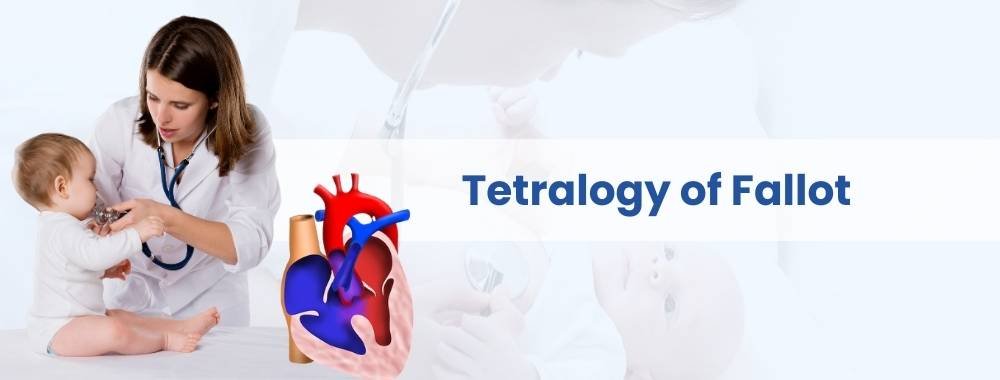
Tetralogy of Fallot is a heart condition present at birth, with four defects reducing oxygen in the blood and making it harder for the baby to breathe.
Normally, your blood follows a specific path through your heart with each heartbeat. But in tetralogy of Fallot, the heart has structural problems that allow some oxygen-poor blood to bypass the lungs and flow directly into the aorta. This means that some blood without enough oxygen is sent to the body instead of going to the lungs to pick up oxygen.
Tetralogy of Fallot has four related problems. These problems affect how blood flows through the heart. The four main issues are:
There is a hole in the wall between the two lower chambers of the heart, this hole helps oxygen-rich blood from the left ventricle to mix with oxygen-poor blood from the right ventricle.
The valve that carries oxygen-poor blood to the lungs is too narrow, so the heart has to work harder to push blood to the lungs, and less oxygen reaches the body.
The right side of the heart becomes thicker because it has to work harder to pump blood through the narrow pulmonary valve.
In a normal heart, the aorta carries oxygen-rich blood from the left ventricle to the body.
In Tetralogy of Fallot, the aorta is positioned between both ventricles, which means some oxygen-poor blood from the right ventricle also flows into it, reducing oxygen levels in the body.
Tetralogy of Fallot (TOF) happens when a baby's heart doesn’t develop properly before birth. Doctors are not sure exactly why this happens; it may be due to changes in genes and chromosomes. Some children with genetic conditions like Down syndrome and DiGeorge syndrome have a higher chance of having TOF.
Other factors can also increase the risk of TOF, including smoking, taking certain medicines during pregnancy, a family history of heart defects, and some health conditions in the mother, like diabetes and rubella during pregnancy.
A baby born with the typical form of Tetralogy of Fallot (TOF) may be diagnosed within the first few days due to a bluish skin color and a heart murmur. However, most babies with TOF do not show symptoms right away. Over time, their skin may become darker due to low oxygen levels, and they may experience slow growth.
The most serious problem in TOF is a tet spell where the baby suddenly becomes very blue and struggles to breathe, and it can be life-threatening. If TOF is not treated, the baby’s body may try to make more red blood cells leading to thickened blood called polycythemia.
Fill in your details and we'll get back to you soonGet Free Treatment Quote
In babies with Tetralogy of Fallot (TOF), spells act as warning signs. These spells cause irritability, crying, and a sudden increase in cyanosis (blueness of the skin). Babies may breathe deeply, become exhausted, sleep, and they might even lose consciousness. These spells usually happen in infants, they can be life-threatening and also lead to long-term brain damage.
Tetralogy of Fallot is treated with two types of surgery. One surgery creates a temporary improvement by using a shunt to increase blood flow to the lungs. The other surgery fully repairs the two main issues caused by tetralogy of Fallot. Patients may have one or both of these surgeries during their lifetime.
The most common sign of Tetralogy of Fallot (TOF) is cyanosis, which means the skin, lips, and nails turn blue. This happens because the body is not getting enough oxygen-rich blood.
Sometimes, babies with TOF have tet spells, where their oxygen levels drop, especially when they are crying and feeding. During these spells, they may suffer trouble breathing or breathing very fast, feel tired and weak, struggle with feeding, and gain weight.
Yes, Tetralogy of Fallot can happen in adults. This may occur if not found and treated during childhood, complications develop later in life.
In a healthy heart, the right side pumps blood to the lungs to get oxygen, and the left side pumps oxygen-rich blood to the rest of the body.
In a child with Tetralogy of Fallot, there is a hole in the wall between the right and left sides of the heart. This hole helps some oxygen-poor blood from the right side to mix with oxygen-rich blood on the left side. However, some of the mixed blood which has less oxygen flows to the body.
There is also a narrowing and blockage in the pulmonary valve, which is the passage that sends blood from the right side of the heart to the lungs. This makes it harder for blood to reach the lungs and get oxygen. In some cases, the valve is completely blocked, which means no blood can flow to the lungs.
The tetralogy of fallot surgery cost in India associated with tetralogy of Fallot are lower in India than in other countries, like:
Cost Component | Details | Estimated Cost in USD |
Pre-Operative Consultation and Diagnosis | Consultations, X-rays, CT scans, MRI scans, blood tests. | 350 USD |
Surgery Costs | Include surgeon fees, type of surgery, and hospital stay. | 6200-7200 USD |
Rehabilitation and Follow-Up | Physiotherapy sessions, medications, supportive devices, and follow-up visits. | Variable by Procedure |
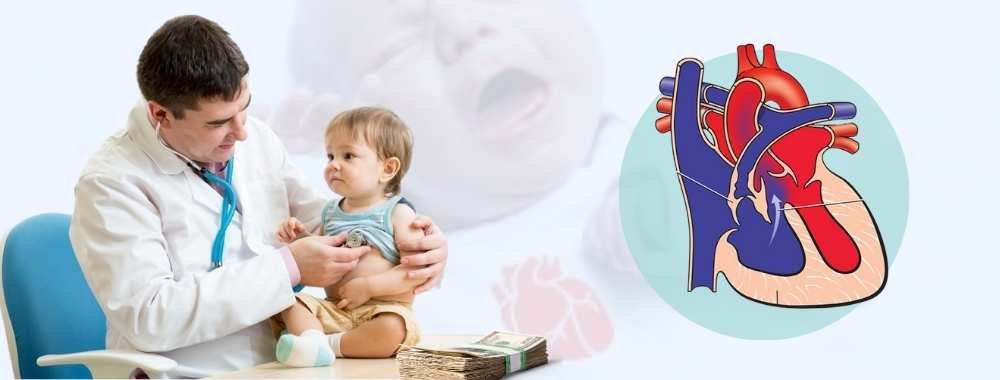
Below are the most common factors that impact overall expenses:
Before surgery, tests like echocardiograms, MRIs, and cardiac catheterization add to the total tetralogy of fallot surgery cost in India.
Highly skilled and experienced surgeons, especially pediatric heart specialists, charge more.
Pediatric specialists, child-friendly hospitals, and special anesthetics increase the tetralogy of fallot surgery cost in India, whereas surgery in adults may be more challenging because of long-term heart issues, which make it costly.
Private hospitals charge more than government hospitals because they offer better facilities, advanced equipment, and highly experienced doctors.
The location of the hospital has higher costs because of expensive medical facilities.
If the condition is severe and comes with other heart problems, the surgery will be more complicated and cost more.
Emergency surgeries or maybe late diagnoses that require more extensive treatment can be more expensive.
TOF usually requires open-heart surgery, but in some cases advanced and minimally invasive procedures may be used that impact overall cost.
Hospitals using high imaging and monitoring systems may have higher charges.
After surgery, staying in the ICU and taking medicines like antibiotics can increase the cost.
Charges also include anesthesiologists, nurses, and other medical staff who assist in surgery and post-surgery care.
A longer hospital stay for recovery, monitoring, and complications can increase overall expenses.
If the patient needs cardiac rehabilitation and physiotherapy after surgery, it will also add to the final tetralogy of fallot surgery cost in India.
Fill in your details and we'll get back to you soonGet Free Treatment Quote
Country | Cost Structure |
India | 6200-7200 USD |
United States | 30000-40000 USD |
Germany | 17000-26000 USD |
Turkey | 9000-16000 |
◾Key Takeaways
✅ Affordable Treatment Costs: India delivers a variety of effective options for heart care through board-certified cardiac surgeons and advanced facilities, making high-quality care accessible to international patients.
✅ Advanced Medical Technology: Indian hospitals are equipped with advanced technology and modern infrastructure, facilitating the delivery of high-quality care comparable to international standards while remaining more cost-effective.
Tetralogy of Fallot (TOF) cost
Treatment Name
Estimated Cost
Tetralogy of Fallot (TOF) 6200-7200 USD
India has highly skilled heart doctors who give the best treatment and recovery plans for heart patients.
Heart surgeries in India have a high success rate, and most patients recover well and live healthy lives. However, like any surgery, there are some risks, such as infection and bleeding, but these are usually low.
Before the surgery, we ensure that patients fully understand the procedure, the facilities available, and the costs involved, and are completely open so that patients can make informed choices.
India is known for offering high-quality medical services and also taking care of international patients' needs, like travel arrangements to hospital stays, everything is managed with professionalism and care.
India is becoming a top destination for medical treatments. The country has advanced medical technology and world-class facilities, similar to those in highly developed nations.
Indian surgeons are among the best in the world. They have performed complex surgeries not only in India but also in countries like the Netherlands, Germany, Switzerland, France, the UK, the USA, and Canada.
Despite the high-quality treatment, medical procedures in India are very affordable. The cost is often 40-60% lower than in Western countries.
Choosing India for Tetralogy of Fallot repair surgery means getting top healthcare at a lower cost. We work with the best hospitals and experienced heart specialists who have successfully treated many congenital heart conditions.
We also provide personalized support throughout the journey, from travel and surgery to aftercare. We understand that traveling for medical treatment can be stressful, so we ensure a smooth experience with complete support.
If you are seeking skilled and experienced surgeons for heart problems. You should come to India, where doctors provide expertise with personalized care and advanced techniques for complex heart surgeries.
Beds: 539
New Delhi
Beds: 230
New Delhi
Beds: 710
New Delhi
Beds: 650
New Delhi
Beds: 191
New Delhi
Beds: 310
New Delhi
Beds: 330
Gurugram
Beds: 380
New Delhi
Beds: 402
New Delhi
Beds: 1300+
Gurugram
Beds: 450
Faridabad
Beds: 675
New Delhi
Beds: 500
New Delhi
Beds: 400+
Faridabad
Beds: 106
New Delhi

Max Super Speciality Hospital, Saket

Aakash Healthcare Super Speciality Hospital

Indraprastha Apollo Hospital

BLK Max Super Speciality Hospital

Dharamshila Narayana Superspeciality Hospital

Fortis Escorts Heart Institute

Fortis Memorial Research Institute

Manipal Hospital Dwarka

Max Super Speciality Hospital Shalimar Bagh

Medanta - The Medicity Hospital

Sarvodaya Hospital

Sir Ganga Ram Hospital

Venkateshwar Hospital
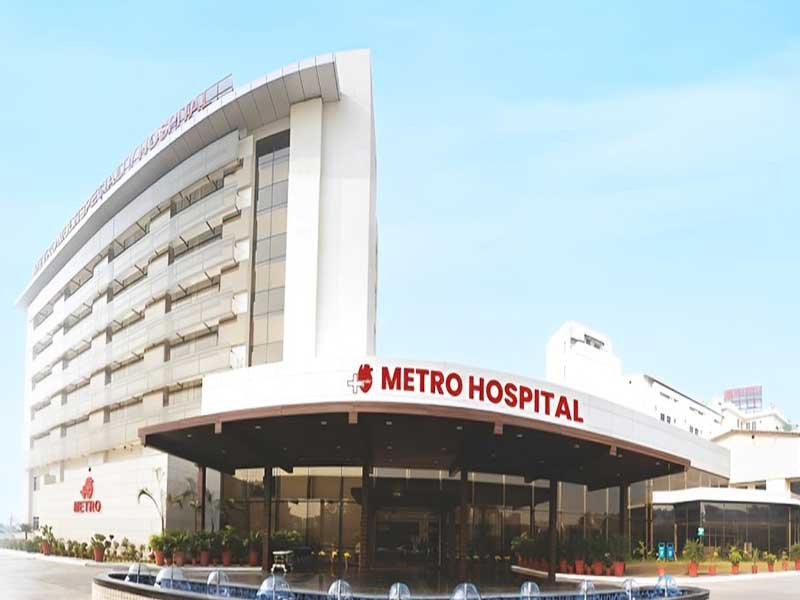
Metro Heart Institute with Multispecialty

PSRI Hospital
Indian hospitals deliver proficient pediatric cardiac surgeons, innovative technology, and world-class care for accurate diagnosis, effective treatment, and supportive care for international patients.
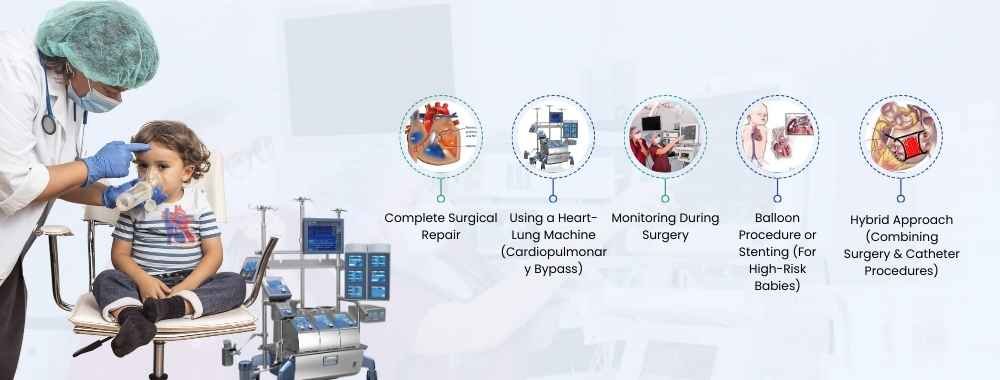
The main treatment for TOF is open-heart surgery. Doctors close the hole in the heart and widen the blocked pathway from the heart to the lungs. This helps blood flow properly to the lungs to get oxygen.
During the surgery, a special machine (cardiopulmonary bypass) takes over the heart and lungs. This helps doctors to operate on a still and blood-free heart, making the procedure safer and more effective.
A special ultrasound is used during the operation to check if the heart repair is successful before stopping the heart-lung machine.
It ensures the patient's heart rate, blood pressure, and oxygen levels remain stable during the procedure.
Some babies are too weak for full surgery, so doctors may use a balloon to open the blocked valve, called balloon valvuloplasty, or place a small tube to keep blood flowing. This helps improve the baby's condition before a complete surgery is done.
Some advanced hospitals use a mix of surgery and catheter techniques. This approach is less invasive and helps stabilize very sick infants before they undergo full heart repair.
Doctors might do several tests to find out if a baby has tetralogy of Fallot and to get more details about the baby's heart and blood vessels, including:
A small sensor that clips onto the fingertip, toe, and ear measures how much oxygen is in the blood.
A test that records the electrical activity of the heart.
An ultrasound picture of the heart records the motion of the blood through the heart and can measure the direction and speed of blood flow.
A thin, flexible tube called a catheter is inserted into the heart, usually through a vein in the leg or arm, to get information about the heart, blood pressure, and blood oxygen levels.
CT scans or MRI tests can be done to help with surgical planning.
🟢Do’s Before Surgery
✅ You should go for check-ups with a heart doctor and get tests like echocardiograms and MRIs when needed.
✅ You must inform your doctor about any medicines, vitamins, and supplements you are taking.
✅ Follow your doctor’s instructions carefully when taking medicines like diuretics to control symptoms.
✅ Eat a healthy diet including lots of fruits, vegetables, lean meats, and whole grains in your meals.
✅ Infants with TOF may need smaller, more frequent feedings to avoid getting too tired.
✅ Make sure all necessary vaccines, especially for children, are taken on time to prevent infections.
✅ Infections can be serious for people with heart conditions, so take precautions to stay healthy.
✅ Older children and adults should try relaxation techniques to keep stress levels low and protect the heart.
✅ You should stay hydrated because it helps keep blood volume and pressure stable.
✅ If you or your child have trouble breathing and any worsening symptoms, then go to the hospital right away.
🔴Don’ts Before Surgery
❌ Don't delay doctor visits because postponing tests and treatment can cause serious problems.
❌ If you have symptoms like severe breathing trouble and fainting, you must get help immediately.
❌ Too much exercise can be hard on the heart, always ask your heart doctor what activities are safe.
❌ Never change and stop your medicines without your doctor’s advice.
❌ Infections can make heart problems worse, so get them treated quickly.
Before the Procedure
Before the surgery, your doctor will perform some tests to check your baby's heart and overall health. These may include:
During the Procedure
The surgery usually takes 5 to 6 hours, but preparing and recovering will take longer. It happens in a special heart surgery room.
After the Procedure
After surgery, your baby will stay in the ICU for a few days for recovery. During this time, the medical team will:
Fill in your details and we'll get back to you soonGet Free Treatment Quote
Children who have surgery to fix tetralogy of Fallot usually have very good long-term health. Over time, most children return to normal levels of activity, appetite, and height.
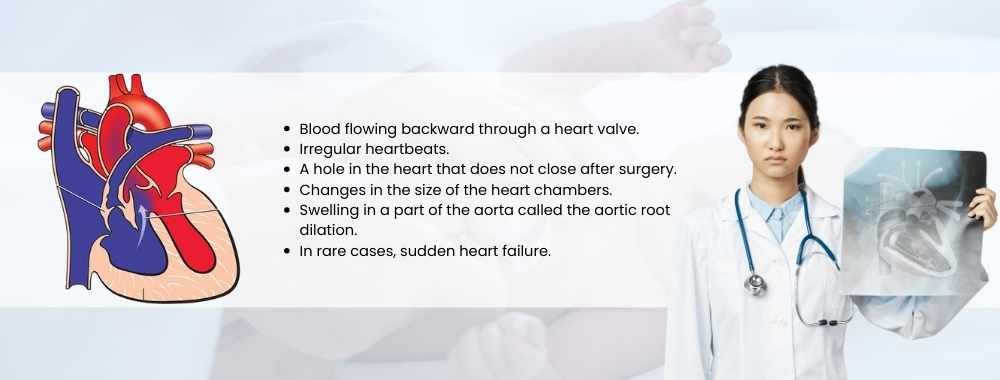
A possible complication of tetralogy of Fallot is an infection of the heart's inner lining and valves, known as infective endocarditis. Sometimes, doctors give antibiotics to help prevent this infection. After surgery, some complications can happen, but most people recover well. Possible complications are:
Hospital Stay and Recovery Time
The hospital stay after tetralogy of Fallot is usually 8 days, with recovery taking 20 days, depending on the patient’s condition.
The success rate for this procedure is generally around 95%, yet it depends on the patient's overall health.
Why Choose Mejocare for Tetralogy of Fallot in India?
✅ Experienced Orthopedic Surgeons, Neurosurgeons: We connect you with highly skilled, board-certified pediatric cardiac surgeons with over 25 years of experience who ensure advanced care and reliable treatment options for complicated heart problems.
✅ JCI/NABH Accredited Hospitals: We partner with hospitals equipped with the newest technologies, including robotics, machine learning, and innovative diagnostic and therapeutic tools. These high-quality facilities deliver complete and personalized care for international patients.
✅ Additional Advantages: We provide quick responses, exact cost estimates, assistance with medical visas, accommodation in India, and priority scheduling with top doctors. Furthermore, we make your arrival in India easy with airport pickup, hotel transfers, and support during your hospital stay, ensuring a smooth experience during your treatment.
Tetralogy of Fallot needs immediate treatment to prevent serious problems. India provides top-quality healthcare, skilled surgeons, and affordable surgery for complex heart issues, making it a great choice for patients seeking the best treatment.
Disclaimer
The information provided in this article is for general advice and does not represent an exact cost estimate. For personalized advice, connect with India’s leading doctors through Mejocare. Contact us today for expert assistance.
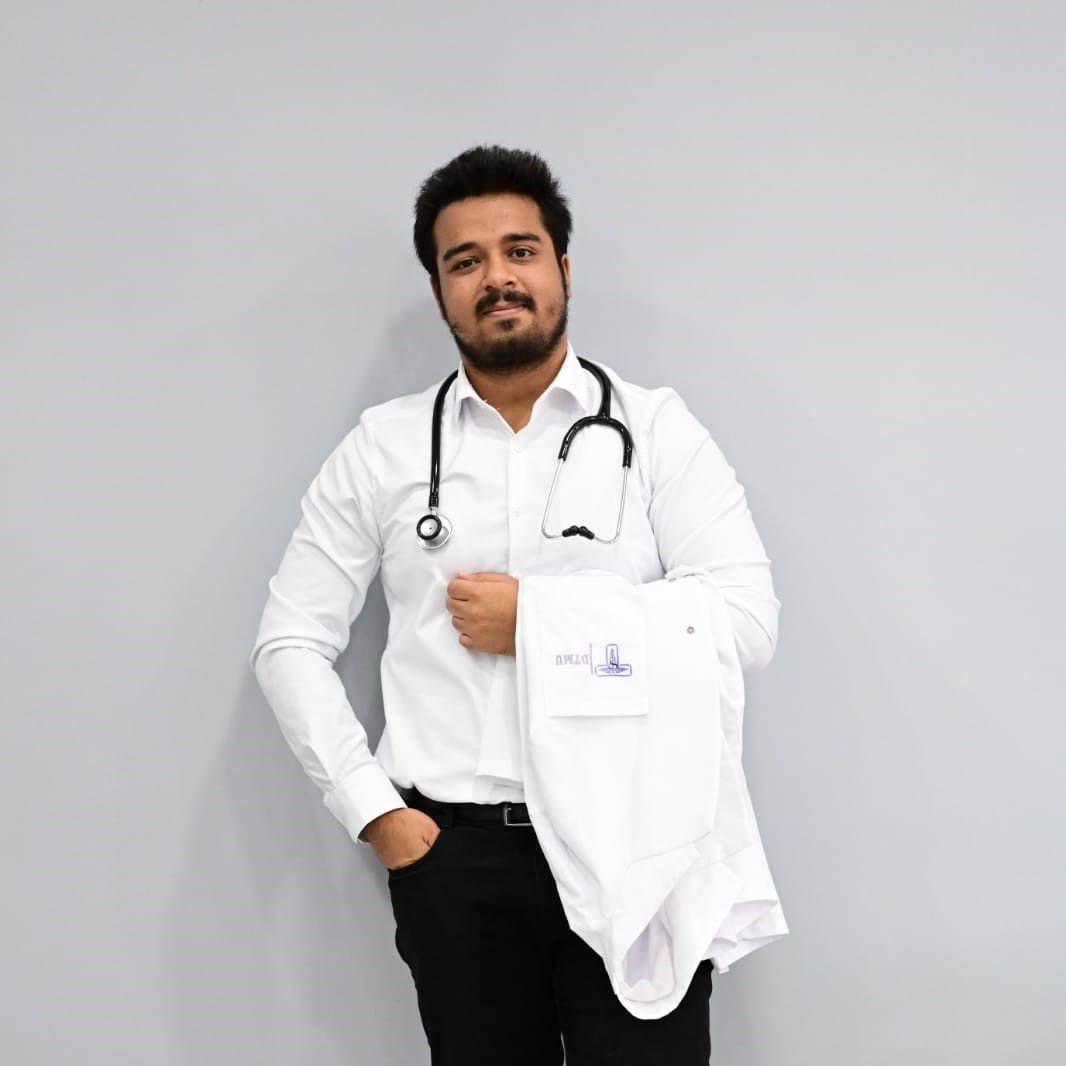
Medically Reviewed By
QualificationsMBBS, DTMU University, Georgia.Radiation Oncology Resident at Burdwan Medical College and HospitalDr. Aryan Malhotra is a skilled and caring doctor. He is a Radiation Oncology Resident at Burdwan Medical College and Hospital. He treats people with cancer and works closely with patients during their treatment.He completed his MBBS from David Tvildiani Medical University in Georgia. He has passed the USMLE... Read More
Registration Number: 95565
Qualification: MBBS, MD from DTMU University, Georgia, Radiation Oncology Resident at Burdwan Medical College and Hospital
The average cost of Tetralogy of Fallot Surgery in India ranges from 6200-7200 USD.
The success rate of Tetralogy of Fallot Surgery in India is around 95%.
7-10 days.
Children typically spend about 7–10 days in the hospital without complications. After the procedure, it's recommended to take a break from school and delay vaccines for about four weeks. Additionally, resuming physical activity post-surgery might require a longer recovery period.
Heart issues like a leaking tricuspid valve, VSDs, enlarged ventricles, impaired heart function, and arrhythmias are possible concerns requiring attention and potential further treatment for optimal heart health.
Patients benefit from tailored physical therapy. Encouraging regular moderate exercise is key to boosting their aerobic capacity. Those who've had TOF corrected can safely engage in high-intensity interval or medium-intensity continuous training without risk.
Yes, it is necessary to have a companion.
After around 2-4 weeks.
Yes, you can do your own research and choose your therapist.
You can use Paracetamol regularly to manage mild to moderate pain. Moderate pain can be managed using non-steroidal anti-inflammatory drugs (NSAIDs) like diclofenac or ibuprofen.
Yes, insurance will cover the cost of a Tetralogy of Fallot Surgery in India.
To discover the top doctors or hospitals in India, you can visit our website, mejocare on the doctors' page, you can filter and find the finest doctors, while on the hospital page, you can identify the best hospitals. Additionally, you can reach out to us, and we will gladly offer you all the necessary suggestions and information you need.
5-6 hours.
No, there is no waiting list for Tetralogy of Fallot Surgery in India.
Tests like blood tests, chest X-rays, PET scans, and heart tests, and for donors, specific screenings are typically required to assess health and eligibility.
The surgical procedure for Tetralogy of Fallot is conducted using general anesthesia.
After 2-4 weeks.
Patients with weakened immune systems need to prioritize food safety to avoid illnesses. Nutritional support, including essential nutrients like calcium, vitamins, and minerals, is vital for healing and combating the effects of treatment. It's crucial to avoid high-lactose foods and opt for lactose-free alternatives. Higher calorie and protein intake during illness and treatment are often necessary for better recovery.
After surgery, monitor your vital signs, tend to your wound, manage complications, consider rehab services, and attend follow-up appointments for a smooth recovery.
Our care team can help you.
